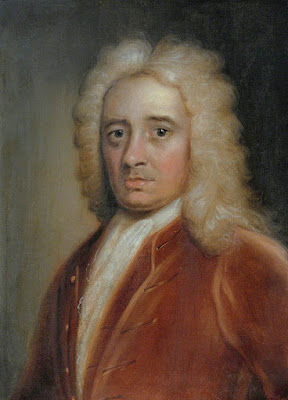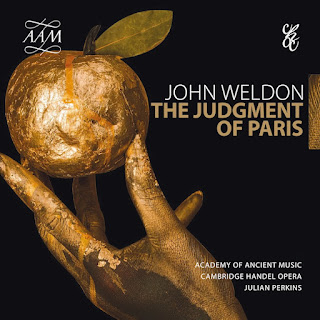John Weldon: The Judgement of Paris; Helen Charlston, Kitty Whately, Anna Dennis, Thomas Walker, Jonathan Brown, Academy of Ancient Music, Cambridge Handel Opera Company, Julian Perkins; AAM
Reviewed 1 April 2025
Stylishly engaging performances highlight the imagination and sense of drama in John Weldon’s winning entry in that 1701 English opera competition, despite the fact that we know the competition had little effect on English opera and the composer went on to concentrate on sacred music
The Musick Prize offered in 1701 by a group of wealthy English aristocrats for a setting of William Congreve’s libretto The Judgement of Paris excited considerable interest at the time. Four composers entered, John Eccles (Master of the King’s Music), Gottfried Finger (a London-based, Moravian viol virtuoso), Daniel Purcell (younger brother of Henry Purcell) and John Weldon (organist of New College, Oxford). Weldon seems to have been the least experienced, dramatically. Eccles worked with Thomas Betterton’s acting company at Lincoln’s Inn Fields Theatre, whilst Finger and Purcell were house composers at the rival Drury Lane Theatre.
In the event, Weldon’s work won, to evident surprise in musical circles. The competition, however, would not kick start English opera. Eccles’ 1706 full-length opera Semele (also with a libretto by Congreve) never reached the stage and Handel’s entrance onto the English operatic stage with Rinaldo (in 1711) changed things completely.
Having recorded Eccles’ Semele in 2021 [see my review], Julian Perkins, the Academy of Ancient Music (AAM) and Cambridge Handel Opera have turned their attention to John Weldon’s winning entry in the competition, The Judgement of Paris. This premiere recording (yes, really) is released on AAM’s own label with Thomas Walker as Mercury, Jonathan Brown as Paris, Helen Charlston as Juno, Kitty Whately as Pallas Athene, Anna Dennis as Venus, plus Anna Cavaliero and Aksel Rykkvin as attendants on Pallas.
For the competition, the four operas were performed by pretty much the same chorus and orchestra, but the composers chose their own soloists. Each composer would have played to their strengths in performance, Eccles was as string player, Purcell and Weldon were experienced organists, whilst Finger probably played bass viol in the continuo team. The theatre’s setup seems to imply that these were performances more in the manner of Handel’s later oratorios, without elaborate stage machinery. And whilst Congreve’s libretto has elements of the 17th century masque in it, there is no mention of dancers or dancing.
 |
| Portrait of John Weldon from the Bate Collection |
Despite not being a man of the theatre, Weldon brought a practical eye to the whole project. He massaged the libretto, giving a far bigger role for the chorus from early on in the opera, thus adding a greater element of variety to proceedings. And the soloists are often accompanied by small groups of solo instruments, rather than the whole ensemble, which would have made the work far easier to rehearse! Finally, there is an Italian element to Weldon’s writing with directional harmony and enjoyably catchy tunes, perhaps designed to appeal to Italian opera loving aristocrats.
Congreve’s libretto for The Judgement of Paris, presumably written specially for the competition, is something of a hybrid. It lacks the element of plot and drama associated with Italian opera, yet has none of the dancing associated with the masque. It also lacks much opportunity for the spectacle and elaborate stagecraft associated with both genres. What it does is give a compact, easily performable work which made the competition viable. But it means that, if we are looking for the origins of English opera as a genre, the competition is not entirely valuable.
The new recording does Weldon’s work complete justice and what emerges is a musically engaging work, superbly performed. Helen Charlston, Kitty Whately and Anna Dennis are each a complete delight as the three goddesses, each singer bringing a breadth of style and personality to her performance. Charlston gets relatively short opportunities but manages to be wonderfully imperious at first and then singing with marvellous gusto. Whately has great fun as Athene initially tries to out sex the goddess of love by being seductively intimate, before the more martial elements come into play including an enjoyably lively trio with her two attendants, Anna Cavaliero and Aksel Rykkvin [incidentially, Rykvvin, now a baritone, had a distinguished career as a boy treble, see my review]
Anna Dennis as Venus certainly gets the short (or long) straw as her substantial role has a significant amount of virtuoso singing required. At her entry she is marvellously seductive, but then must wait and finally Dennis is able to deliver her sequence of arias, always stylish, the writing becomes busy yet Dennis makes it marvellously laid back. The three singers also have great fun in their trio, when it is perfectly clear that the three goddesses do not get on.
The two men are equally engaging. Thomas Walker as a tenor Mercury, commands attention from the outset and I enjoyed Walker’s way with Weldon’s arioso, whilst Jonathan Brown is a bluff Paris, quite clearly rather out of his depth.
The chorus’ repeated entry into the mix (Weldon’s libretto has five extra choruses) makes for a more varied, more Henry Purcell like experience that the singers here make the most of. Also Athene gets two attendants who join her for her final aria.
Julian Perkins directs with a secure hand when it comes to dramatic pacing, whilst the individual instrumentalists contribute some finely stylish playing. The result is pacey and engaging, entirely disguising the rather static nature of the plot. There is a large-scale Sonata to begin things, some five minutes of orchestral music featuring David Blackadder’s trumpet, all in all creating a distinctly Purcellian atmosphere, and there are four shorter symphonies during the opera giving more opportunities.
Overall there is a lovely sense of dramatic engagement in the performance, from soloists and ensemble, along with a feeling that they were enjoying themselves. This results in a performance that feels like living drama, and really draws you in; a long way from the sort of worthy academic exercise that it might have been.
Weldon’s The Judgement of Paris is never going to be a regular in theatres, but this disc makes a fine companion to AAM’s early recording of Eccles’ Semele. The recording comes with an admirable booklet full of essays which shed light on Weldon, the competition and what we know about the original performance.
And what of John Weldon, after the competition? Well, his work on the revival of Shakespeare’s The Tempest in 1712 created the last great Restoration semi-opera, but Weldon’s career essentially took a sacred focus, becoming second organist that Chapel Royal as well as holding posts of St Bride’s Church, Fleet Street, and St Martin-in-the-Fields.
Further reading on Planet Hugill:
- From Rinaldo to Amadigi di Gaula: a look at Handel’s highly experimental early London period
- The Invention of English Opera: the surprising history of opera in 17th century England
- Part Two, the brief flowering of English opera, the rise of Italian opera and the development of ballad opera
- Part One, from masques to dramatick-opera
- The pocket watch and the news periodical: how the public concert developed in 17th and 18th century London
The blog is free, but I’d be delighted if you were to show your appreciation by buying me a coffee.
Elsewhere on this blog
- Up close and personal: David Butt Philip & Friends Gala at St Paul’s Opera, Clapham – opera review
- Pure enjoyment: Peter Moore & Tredegar Band give the first recording of Simon Dobson’s concerto for Moore – record review
- Bespoke Songs: soprano Fotina Naumenko on commissioning four composers for works for soprano and diverse ensembles – interview
- Richard Strauss at the Deutsche Oper Berlin:
- Elektra & Intermezzo – opera review
- Arabella with Jennifer Davis & Heidi Stober – opera review
- Traces of trauma: Britten Sinfonia premiere Michael Zev Gordon’s A Kind of Haunting marking 80th anniversary of the end of WWII – concert review
- Letter from Florida: Stéphane Denève & New World Symphony on impressive form in Britten’s War Requiem – concert review
- Drawing you in: young Uruguayan counter-tenor Agustin Pennino in a nadmirably ballsy programme at London Transport Museum – concert review
- Reshaping the narrative: Leslie Korngold on the historic release of his grandfather’s recording of his Symphony – interview
- Between Friends: a new disc of Jonathan Dove’s music celebrates friendship & collaboration in music – record review
- Home









